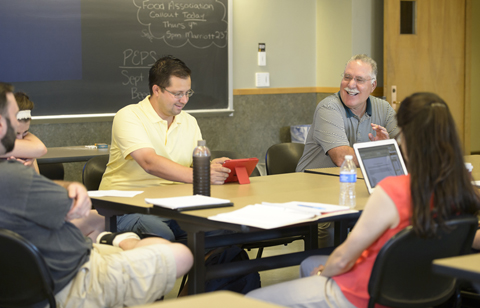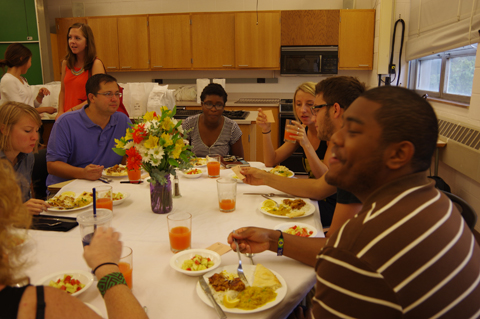World Food Problems course inspires students to view hunger from multiple facets
September 24, 2014
 |
|
Students in the World Food Problems course talk with Dennis Savaiano, the Virginia C. Meredith Professor of Nutrition Policy, during one of the course's small-group discussions. In the discussions, students are encouraged to share their viewpoints and insights into the course's material. (Purdue University photo/Charles Jischke) |
The concept of global hunger is the very definition of a grand challenge -- it's a maddeningly complex issue without any single solution, and studying its many prongs falls into a variety of academic disciplines.
In recognition of this challenge's complexity, five Purdue professors have designed and are teaching a unique course this fall that provides a multidisciplinary perspective to global hunger. Called World Food Problems, the course consists of five sections with a total of 50 students.
The goal, the faculty members say, is to combine Purdue's vast expertise in agricultural economics, consumer science, nutrition science and political science into a single course that teaches students a comprehensive view of global hunger. Further, the course seeks to holistically equip them to pursue possible future solutions.
"The students who are taking this class are coming into it with their own perspectives of global hunger," says Dennis Savaiano, the Virginia C. Meredith Professor of Nutrition Policy and a faculty member teaching the course.
"One of our goals is to broaden that perspective, so that when they approach global hunger in their careers, they understand multiple perspectives -- and can come up with multiple comprehensive solutions -- instead of just one."
Teaching the course are Lalatendu Acharya, assistant professor of consumer science; Patricia Boling, associate professor of political science; Gary Burniske, managing director of the Center for Global Food Security; Savaiano; and Gerald Shively, professor of agricultural economics. Onyekachi Aghasili, a graduate student in agricultural economics, is serving as a teaching assistant.
 |
|
At the beginning of the semester, students in World Food Problems participated in a banquet that doubled as an exercise to help them understand worldwide food distributions and its inequities. (Purdue University photo/Dennis Savaiano) |
During the class, the professors present multiple angles of global hunger to get students to think critically about its root causes and potential solutions.
For instance, a key fact is that 10 percent of the world's population is undernourished. A political scientist might take that fact and seek to examine the policy reasons behind it, while a consumer scientist might explore why some populations don't have access to enough food and a nutrition scientist might look at why certain food supplies are nutritionally inadequate. The class, however, encourages students to look at the problem from all of these angles.
The structure of the class is unconventional, as well. On Mondays and Wednesdays, the professors give a joint lecture to students in all sections. On Fridays, the course breaks into small groups made of 10 students and one faculty member.
In the small-group discussions, students are encouraged to share their viewpoints and insights into the course's material. The students, who are upper-level undergraduate students and graduate students, come from a variety of academic and life backgrounds.
For these reasons, World Food Problems is unique, the professors say. And its multidisciplinary nature dovetails with Purdue Moves, which, among other things, seeks to apply Purdue's research and teaching to address the world's food needs.
"Once students have completed this class, we think it will better equip them to seek solutions to this complex and difficult problem," Acharya says.
"Ultimately, the goal is to get students involved in research, including at places such as the Purdue's Center for Global Food Security. This class is the beginning of something that could lead to more student-centered engagement across campus."
Further, the Center for Global Food Security offers small grants to groups of multidisciplinary researchers, including student innovation grants for domestic and international research about food security. The center also offers internships to undergraduates interested in studying global hunger. The students in World Food Problems will be positioned well to seek these opportunities, Burniske says.
Although the professors benchmarked other universities' efforts to teach about global hunger, they say that another class that closely resembles World Food Problems simply doesn't exist. There's also no single textbook that approaches global hunger from a multidisciplinary perspective.
However, that might change, the faculty members say. As the course evolves, they may collaborate to write a textbook that could be used to spread the course's model to other institutions across the country.
In this way, thanks to World Food Problems, Purdue is taking a multipronged approach to tackling global hunger: Its faculty are forming new collaborations to encourage teaching and scholarship about the issue, and its students will be prepared to approach it in the future.
Plans are already in motion for the course to be taught again in fall 2015. The faculty members also are examining how it might fit into the University's majors and other programs of study.
"One thing that's clear to us is that solving global hunger and related problems is going to take a new generation of leaders, researchers and policymakers," Shively says.
In fact, the faculty members say it's their goal that students who complete this class will be positioned to step into those roles in their future careers. In the great Boilermaker tradition, they say, the class will truly equip students to move the world forward.
Writer: Amanda Hamon Kunz, 49-61325, ahamon@purdue.edu

